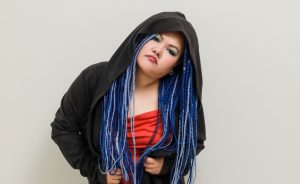I felt like I’m a fire and I’m burning everyone around me” — Pop singer Kim from Mizoram shares her story about her struggles with bipolar disorder and how music became her therapy
Lalnunkimi Ralte, lovingly called by everyone as Kim, is a singer, songwriter, and music teacher from Mizoram. Accomplished in her field, her journey has been fraught with difficulties. From a struggling childhood to battling Bipolar Affective Disorder (BPAD), Kim has always found passion in the therapeutic process of music and writing. Not unlike many women in India whose mental health gets neglected, Kim was diagnosed much later in her life. It made her healing process longer but she is grateful for the diagnosis that helped her put the pieces together. Not wanting anyone else to go through the same period of uncertainty and struggles that she went through, Kim is actively trying to spread awareness of BPAD and mental health through her work. We had the opportunity to have a heartfelt conversation with Kim and give her voice the chance to reach many.
Kim has spent most of her life being passionate about music. At the age of 9, she was singing in All India Radio and as a teenager, she was sure that she wanted to be a professional musician. She went on to realize that dream now that she has released albums, both in English and Mizo, and has also taught music at various places including Cambridge International School in Bangalore. But it didn’t come without difficulties, we realize, as she tells us about her struggles with bipolar disorder. During a heartfelt conversation with us, Kim explained her deep desire to spread awareness about this mental illness. “It is difficult to lead a normal life,” she said as she shared her own story.
CHILDHOOD ANXIETIES
At a very young age, she witnessed her father die in a horrible accident. Ever since then, anxiety and panic have been her constant companions. She believed that she was a wistful child, and was consumed by the fear of losing her mother too. If her mother failed to come back home on time, panic would take over and she would convince herself that her mother’s death. Such unreasonable fears and her abandonment issues started affecting her dating life as well.
When she started singing, she was worried about how she looked. She would put herself on diets and throw up after every meal. She said back then, she never realized she was bulimic. She was appearing on the television and performing on stage, and she felt that people were judging her.
BATTLE WITH DEPRESSION AND BPAD DIAGNOSIS
In 2007, she was diagnosed with depression while she was working as a hotel singer. She was put on medication but it soon became very tiring. Especially when she starts to feel better, she tends to get off her medication because it becomes a tiring errand, which eventually results in worsening her condition. In 2019, she started experiencing hyper mania. “My brain was traveling at 100 miles per hour,” she explained how for six months, she was constantly active, energetic, and moving between jobs and parties—all the while she never felt tired. Finally, she collapsed in the middle of the day on the floor of her school, lying motionless for hours. This incident made her realize that something was not right and she took a sabbatical from school and went to see a doctor. Finally, in January 2020, she was diagnosed with Bipolar Affective Disorder. She was 36 years old at the time.
The diagnosis helped her come to terms with a lot of things in her life, “once diagnosed, you realize why you were acting that way, you put the pieces together.” She was again put on a lot of medications including anti-depressants and mood stabilizers. Due to the extent of her illness, her doctor suggested electro-conversive therapy. Despite how scary it sounded, she took the leap and after six sessions, her brain started to slow down. ECT calmed her down, her moods were levelled and after a few months, she was able to think more clearly and reflect on herself, helping her become more understanding and empathetic. It also made her strive for awareness so that no one else goes through what she had to struggle with. She always wished that she was diagnosed sooner.
BPAD SIGNS TO LOOK OUT FOR
In her support group, people share their stories and console each other. “All this brokenness inside me has made me more sympathetic. So, I want to help spread awareness however I can. Even if they themselves don’t have it, if their loved ones have it, they would know where all these mood changes, emotions, and behavior come from.” Hence, Kim advises everyone to look out for signs of the three ways bipolar disorder presents itself.
The first is hypomania- when the brain is overactive. Hypomanic episodes make you hyper excited, sleepless, careless, shopaholic, hypersexual, and lose appetite, among other things. “My doctor would take one look at me and would know I’m hypomanic- I would dye my hair and get piercings, etc.” One would become very active but not productive.
The second is a depressive mode. When the depression hits after a hypomanic episode, it is crippling. You are unable to move when you lie down and are constantly tired and sleepy. It also comes with a lot of physical pain. For Kim, she could not move around because of her back pain. The intensity of her emotions and feelings would also multiply by a hundred times. So, you end up experiencing two extremes of mood. Then there are the mixed episodes when you are depressed while being active.
Kim shared how it made her feel guilty, “At first, it felt like I was making excuses for my behavior.” It made her feel like a bad person. But it comes with the disorder. Delusion and doubt accompany the bipolar disorder, which makes it even harder to tell people about it. You also become forgetful and lose the train of thoughts.
There was a lot of unreasonable anger too, which ended up hurting not just herself but the people around her— “I felt like I’m a fire and I’m burning everyone around me.” Her mother was incredibly patient and understanding with her, despite it being so difficult to deal with someone acting so irrationally. Kim’s doctor finally made her realize that she should not use her mother as a punching bag.
So, always look out for sudden mood changes, especially if they are caused by apparently no reason. Kim suggests that if you notice any of these signs, go get help immediately, “Consult a doctor as soon as you can, there is no harm in getting yourself checked up. You might be preventing yourself from causing a lot more damage.” Because she was diagnosed much later in her life, she spent most of her teenage and young adulthood damaging her relationship with herself and others, thinking that she was unreasonable and a bad person. Kim believes that people should know early so they can get the proper help sooner.
“I recently learned that my condition is terminal, and it makes me very upset. Every time I have a hypomanic episode, it comes with brain damage,” she shared. Her condition has taken a bad turn again. She stayed up for five days in a row. She started having hallucinations due to a lack of sleep. And when she does end up sleeping, she struggles to wake up. Even going to therapy has become tiring. Therefore, it becomes difficult to have a scheduled normal life.
FINDING WAYS TO COPE
In all these struggles, music and writing becomes her therapy. Writing is an outlet for her emotions and thoughts, it helps her process everything in a healthy manner. As for her music, it becomes a reflection of her struggles with bipolar disorder. She addresses the nature of BPD in her music with metaphors of relationships, “It’s like an ex living in the same city as you, running into each other at every street, every park, every club.” She is trying to help people be more aware of BPD in the only way she knows best—through her words and music.
She has the same advice for people struggling with BPAD—find your passion, the thing that helps you, and stick with it. If she could pursue her passion for music and even win the International Women’s Achievement award in music, while having BPAD, then you could also find your way through it. And most importantly, don’t be afraid to seek help. She has experienced how difficult it is to open up to people when more often the reaction you get is being told to snap out of it, that it’s in your brain. “If I could snap out of it, I would have done it a long time back.” Kim believes that no struggles are big or small. If you think your problems are difficult, then your feelings are valid and no one can tell you otherwise.




